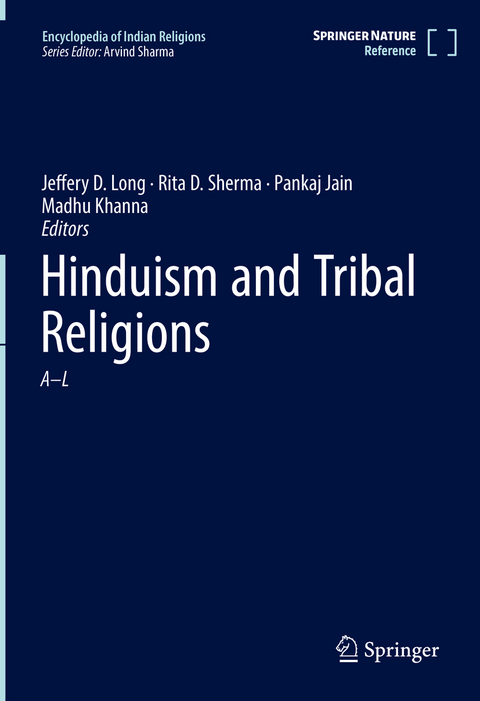
Hinduism and Tribal Religions
Springer (Verlag)
978-94-024-1187-4 (ISBN)
This volume fills the need felt by Hindus both in India and the diaspora for more knowledge about modern-day Hinduism, Hindu history and traditions. It takes into account three main aspects of Hinduism: that the active pan-Indian and diasporic language of the Hindus is English; that modern Hindus need a rational rather than a devotional or traditional exposition of the religion; and that they need information about and arguments to address the stereotypes which characterize the presentation of Hinduism in academia and the media, especially in the West.
Dr. Jeffery D. Long, Professor of Religion and Asian Studies, specializes in the religions and philosophies of India. He is the author of several books, including Hinduism in America: A Convergence of Worlds and Jainism: An Introduction, and numerous articles. He is also the editor of the series Explorations in Indic Traditions for Lexington Books. In 2018, he received the Hindu American Foundation’s Dharma Seva Award for his ongoing efforts to promote more accurate and culturally sensitive portrayals of Indic traditions in the American educational system and popular media. He has spoken in numerous venues, both national and international, including Princeton University, Yale University, the University of Chicago, and Jawaharlal Nehru University (in India), and has given three talks at the United Nations. Professor Rita D. Sherma, PhD, is Director of the Mira and Ajay Shingal Center for Dharma Studies, Chair of Hindu Studies, and Associate Professor of Dharma Studies at the Graduate Theological Union, Berkeley, CA. She is Editor-in-Chief of the International Journal of Dharma Studies. Dr. Sherma is the editor of a number of volumes on themes in Hindu Studies and Dharma Studies, and author of numerous academic articles in multi-author anthologies. She is the Vice President of the Dharma Academy of North America (DANAM), a scholarly association and forum for academic research on Dharma Studies. Her forthcoming publications include Hinduism and the Divine: An Introduction to Hindu Theology, and Ecology, Ethics, and Enlightenment: A Hindu Ecotheologyfont-family. Professor Pankaj Jain is an internationally recognized academic leader in Sustainability, Jain Studies, Film Studies, and Diaspora Studies. He is the Head of the Department of Humanities & Languages and the Chair of The India Centre at FLAME University. Earlier, he was the founding co-chair of India Initiatives Groupand Associate Professor in the Departments of Philosophy & Religion and Anthropology at the University of North Texas, a tier-1 American university. He holds a Ph.D. from the University of Iowa and an M.A. from Columbia University (both in Religious Studies). His B.E. was in Computer Science from Karnatak University. Prof. Jain has over twenty-five years of work experience in academia and industry.He is currently working on his fourth monograph, Modern Jainism: A Historical Approach, co-editing the Encyclopedia of Hinduism and a volume on Indian and Western Philosophical Concepts in Religion. He recently published his third monograph, Dharma in America: A Short History of Hindu-Jain Diaspora. His earlier monographs are award-winning Dharma and Ecology of Hindu Communities: Sustenance and Sustainability and Science and Socio-Religious Revolution in India: Moving the Mountains. His articles have appeared in several academic journals and on the Huffington Post, Washington Post, Economic Times, Times of India, Speaking Tree, and Patheos. In addition, Dr. Jain is widely quoted in various American and Indian media outlets, including NBC, CBS, and BBC. In July 2020, the New York Times interviewed him, and in 2019 Morgan Freeman interviewed him in his National Geographic series The Story of God. He is a recipient of the Fulbright-Nehru Fellowship for Environmental Leadership and Wenner-Gren Grant, among many other grants. In addition, he was nominated for the Sustainability Leadership Award from Memnosyne Institute. Professor Madhu Khanna, Professor of Indic Religion, is a well-known scholar. At present she is Tagore National Fellow at the National Museum, New Delhi, where she is researching and preparing a definitive catalogue on the celebrated Tantra Art Collection. Until recently, she was the Director of the Centre for the Study of ComparativeReligions and Civilizations, Jamia Millia Islamia, New Delhi, where she now teaches courses in Hinduism, and cross-cultural studies in the areas of Religion & Gender and Religion & Ecology. She has been Bina and Haridas Choudhury distinguished Fellow (2013-14) in Asian and Comparative Studies at the California Institute of Integral Studies, San Francisco. She earned her PhD from Oxford University in Hindu Sakta Tantra. She has authored / edited seven books which include:The Śrīcakra: History, Ritual and Symbol of Goddess Tripurasundarī (forthcoming); Śāktapramodaḥ of Deva Nandan Singh (editor); Religions After September 11, Proceedings of an International Seminar (co-editor); The Subtle Body – An Illuminated Tantric Scroll; t-size: 14px;">Ṛta – The Cosmic Order, Proceedings of an International Seminar (editor); Yantra: The Tantric Symbol of Cosmic Unity, London 1989, The Tantric Way – Art, Science & Ritual (co-author) of which the last two have been translated into German, French, Italian, Korean and Dutch. She has written extensively on the theme of gender and religion and has been part of the South East Asian Network of Women’s Scholars on Gender and Religion sponsored by Henreich Boll Foundation. She is the Founding Member and Chairperson of Tantra Foundation, New Delhi.
From the Contents:Adivasi.- Colonial Perceptions of Tribal Religion.- Khasi Religion.- Medical System of the Khos.- Religion of Bharias.- Religion of the Ao Naga.- Religion of the Ho Tribe.- Religion of the Raika-Rebari.- Religion of the Sumi Naga.- Religion of the Tiwas.- Abhinavagupta.- Abortion (Hinduism).- Acintya-bhedābheda-Tattva.- Adhikāra.- Adultery (Hinduism).- Agastya.- Agrahāra.- Ahalyā, the Human Face of Sacred Infidelity.- Aitareya Brāhmaṇa.- Akka Mahādevī.- Alcohol (Use of).- Alexander the Great.- Amṛtānanda Mayī Mā (Ammachi).- Anandamarga (Ānandamārga).- Appar.- Appayya Dīkṣita.- Arcāvatāra.- Ardhanārīśvara.- Arjuna.- Aryan [Āryan].- Astronomy.- Aum.- Auroville.- Auspiciousness.- Avidyā.- Aśvamedha.- Babri Masjid (Bābarī Masjid).- Bahuchara Mata (Deity of Transgenders).- Basava.- Basham, A. L..- Besant, Annie.- Bhandarkar, R.G.- Bharat Dharma Mahamandal.- Bhedābheda.- Bhoga.- Bhāgavata Purāṇa.- Bhārata Mātā.- Bhāravi.- Bhāskara.- Bhīma.- Bhīṣma.- Bioethics (Hinduism).- Birth Control.- Brahma Kumaris.- Brahma Sūtras (Vedānta Sūtras).- Brahman.- Brahmo Samaj.- Brahmotsava.- Brahmā.- Brāhmaṇa (Brahmin/Brahman).- Brāhmaṇas.- Bādarāyaṇa.- Bāuls.- Caribbean and Central America, Hinduism in.- Chatterjee, Bankim Chandra.- China (Hinduism).- Cilappatikāram (Śilappadigāram, Shilappadigaram).- Cinema, Hindu Themes in.- Citamparam (Chidambaram).- Dattātreya.- Daṇḍanīti.- Demon (Hinduism).- Devīmāhātmya.- Dharma.- Dhyāna.- Dhṛtarāṣṭra.- Education, Hindu (Ancient, Classical, Modern, and Contemporary).- Ekādaśī.- Environmentalism (Hinduism).- Ganesh Chaturthi (Gaṇeśa Caturthī).- Gaṅgeśa.- Gaṇeśa (Gaṇapati).- God, Overview.- Hagiography.- Hanumān (Hanumant, Hanūman).- Hariścandra.- Harivaṃśa.- Hastings, Warren.- Hijra (Hijaḍā).- Himālaya.- Hindu Charitable Endowments.- Hindu Diaspora in Portugal: the Case of our Lady of Fatima Devotion.- Hindu Mahasabha.- Hinduism and Commercialization.- Hinduism in Africa.- Internet, Hinduism on.- Jajmānī System.- Janābāi.- Jones, William.- Jīva Gosvāmin.- Jīvanmukti.- Kaaval Katavul (Guarding Deities).- Kaavu in Kerala (Sacred Groves in Kerala).- Kabīr.- Kali.- Kane, P.V.- Kaurava.- Kaśmir Śaivism.- Kirtan in North America.- Krishnamurti, Jiddu.- Kriya Yoga.- Kumbha Mela.- Kuntī.- Liṅgāyata.- Loka.- Lokāyata.- Lāl Ded.- Līlā.- Madhusūdhana Sarasvatī.- Maharishi Mahesh Yogi.- Mahā-vākya.- Mahābalipuram (Māmmalapuram).- Mahābhārata.- Mantra.- Manuscripts (Hinduism).- Mathematics.- Matrilineality (Hinduism).- Maṇimēkalai.- Maṇipravāḷa.- Meaning (Hinduism).- Medicine (Hinduism).- Meditation (Hinduism).- Megasthenes.- Menstruation: Pollutant to Potent.- Naiker, E.V. Ramaswami (“Periyar”).- Nambudiri.- Nammāḻvār.- Naraka.- Nathdwara.- Nationalism (Hinduism).- Navagraha.- Navarātri.- Naṭarāja.- Neo Vedānta.- Nimbārka.- Nirukta.- Nivedita, Sister.- Nivṛtti.- Niyoga.- Numbers.- Nyāya (and Navya-Nyāya).- Old Age.- Omniscience (Hinduism).- Pallava Dynasty.- Periya Purāṇam.- Pilgrimage – Hinduism.- Poṅkal (Pongal).- Prahlāda.- Prakṛti.- Pramāṇa.- Prapatti.- Prarthana Samaj.- Pratyabhijñā.- Prayaschitta.- Proverb (Hinduism).- Psychological Method.- Reason (Hinduism).- Rebirth (Hinduism).- Relativity (Hinduism).- Religious Tourism.- Rishikesh (Hṛṣīkeśa).- Sahaja.- Saints, Overview.- Samādhi.- Sanskrit (Saṃskṛt).- Sanskrit literature in Maharashtra folk art Keertan.- Sanskritization (Hinduism).- Sat.- Sati (Suttee).- Satyabhāmā.- Savarkar, Vinayak Damodhar (“Veer”).- Saṃnyāsa.- Science.- Scripture (Hinduism).- Shamanism.
| Erscheinungsdatum | 31.12.2019 |
|---|---|
| Reihe/Serie | Encyclopedia of Indian Religions | Hinduism and Tribal Religions |
| Zusatzinfo | 40 Illustrations, color; 8 Illustrations, black and white; XXII, 1822 p. 48 illus., 40 illus. in color. In 2 volumes, not available separately. |
| Verlagsort | Dordrecht |
| Sprache | englisch |
| Maße | 178 x 254 mm |
| Themenwelt | Geisteswissenschaften ► Philosophie ► Allgemeines / Lexika |
| Geisteswissenschaften ► Philosophie ► Geschichte der Philosophie | |
| Geisteswissenschaften ► Philosophie ► Östliche Philosophie | |
| Geisteswissenschaften ► Philosophie ► Philosophie der Neuzeit | |
| Religion / Theologie ► Christentum ► Kirchengeschichte | |
| Geisteswissenschaften ► Religion / Theologie ► Judentum | |
| Sozialwissenschaften | |
| Schlagworte | Christianity in India • Indian diaspora • Indian Religion • Islam in India • Judaism in India • rational exposition of religion • religion and Indian culture • religious diversity • Zoroastrianism in india |
| ISBN-10 | 94-024-1187-9 / 9402411879 |
| ISBN-13 | 978-94-024-1187-4 / 9789402411874 |
| Zustand | Neuware |
| Haben Sie eine Frage zum Produkt? |
aus dem Bereich


